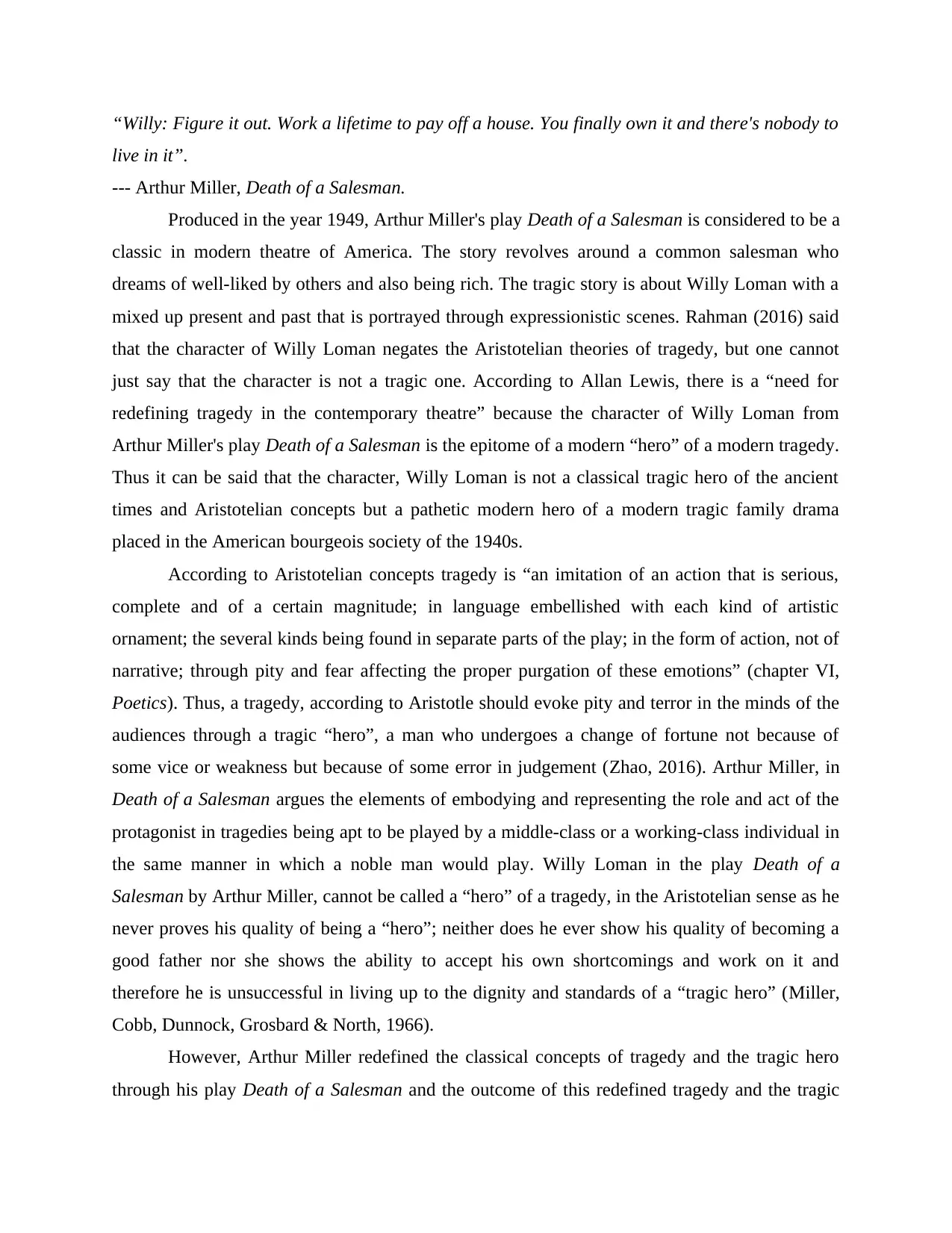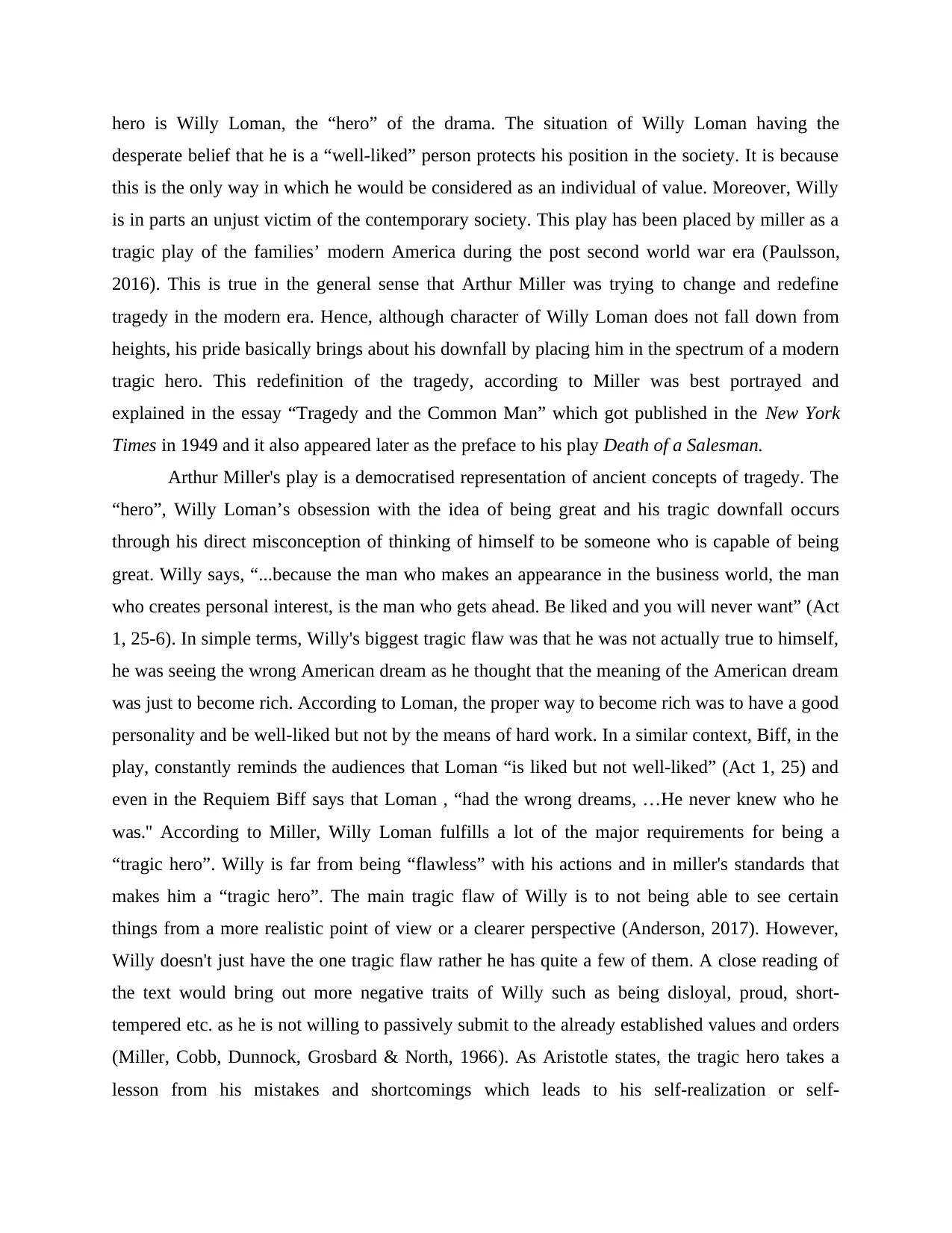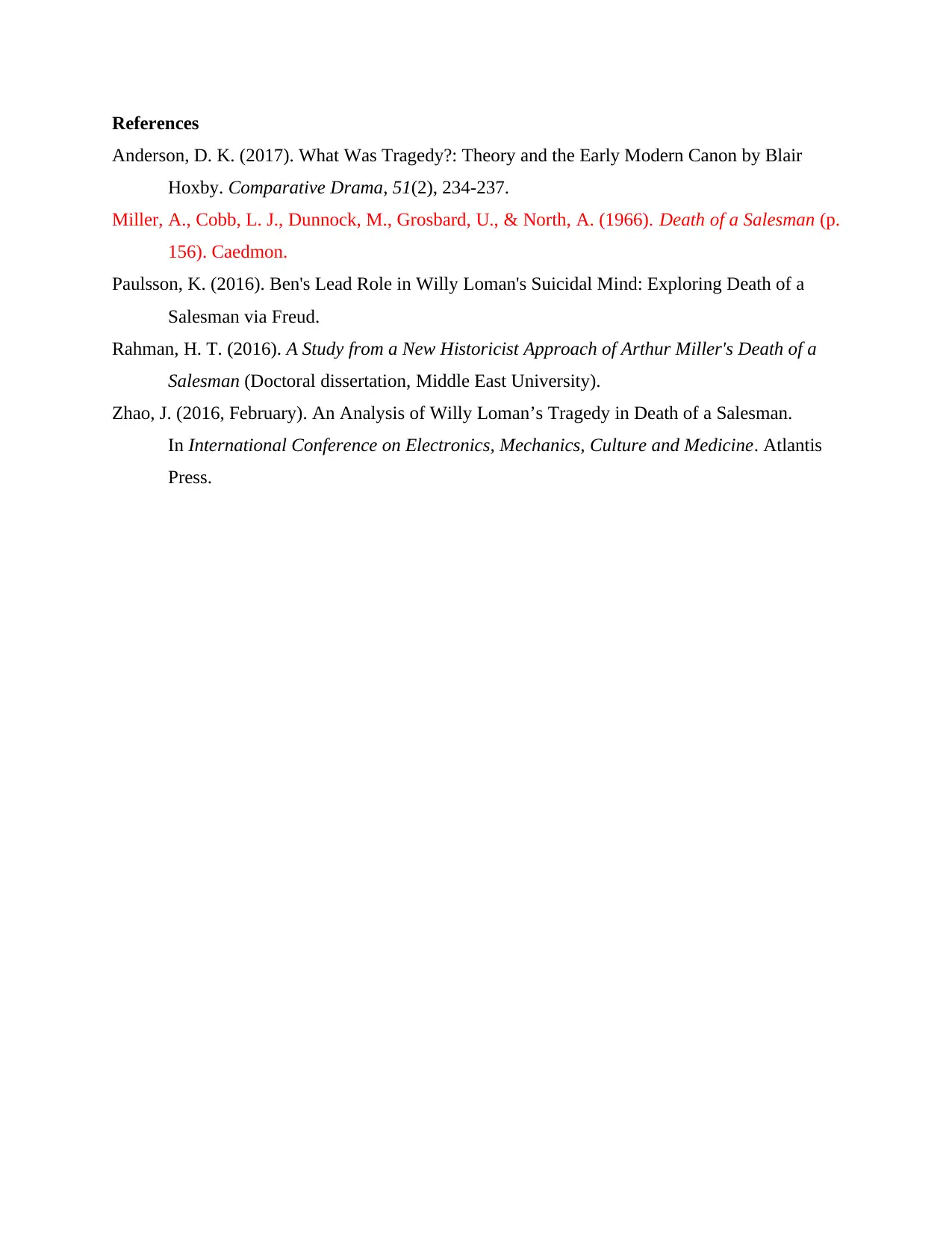Death of a Salesman: Exploring Willy Loman as a Modern Tragic Hero
VerifiedAdded on 2023/01/05
|5
|1409
|54
Essay
AI Summary
This essay provides an in-depth analysis of Arthur Miller's play, Death of a Salesman, focusing on the character of Willy Loman and his portrayal as a modern tragic hero. It examines how Miller redefined the classical concepts of tragedy, contrasting Willy with the Aristotelian tragic hero. The essay explores Willy's flaws, his obsession with being well-liked, and his inability to accept reality, arguing that these traits contribute to his tragic downfall within the context of post-World War II American society. The analysis draws upon Miller's essay "Tragedy and the Common Man" and explores Willy's misconceptions about the American Dream, his relationships, and his ultimate failure to achieve self-realization. References from various sources support the analysis and provide context to the play's themes and characters.

ENGLISH ESSAY
Paraphrase This Document
Need a fresh take? Get an instant paraphrase of this document with our AI Paraphraser

“Willy: Figure it out. Work a lifetime to pay off a house. You finally own it and there's nobody to
live in it”.
--- Arthur Miller, Death of a Salesman.
Produced in the year 1949, Arthur Miller's play Death of a Salesman is considered to be a
classic in modern theatre of America. The story revolves around a common salesman who
dreams of well-liked by others and also being rich. The tragic story is about Willy Loman with a
mixed up present and past that is portrayed through expressionistic scenes. Rahman (2016) said
that the character of Willy Loman negates the Aristotelian theories of tragedy, but one cannot
just say that the character is not a tragic one. According to Allan Lewis, there is a “need for
redefining tragedy in the contemporary theatre” because the character of Willy Loman from
Arthur Miller's play Death of a Salesman is the epitome of a modern “hero” of a modern tragedy.
Thus it can be said that the character, Willy Loman is not a classical tragic hero of the ancient
times and Aristotelian concepts but a pathetic modern hero of a modern tragic family drama
placed in the American bourgeois society of the 1940s.
According to Aristotelian concepts tragedy is “an imitation of an action that is serious,
complete and of a certain magnitude; in language embellished with each kind of artistic
ornament; the several kinds being found in separate parts of the play; in the form of action, not of
narrative; through pity and fear affecting the proper purgation of these emotions” (chapter VI,
Poetics). Thus, a tragedy, according to Aristotle should evoke pity and terror in the minds of the
audiences through a tragic “hero”, a man who undergoes a change of fortune not because of
some vice or weakness but because of some error in judgement (Zhao, 2016). Arthur Miller, in
Death of a Salesman argues the elements of embodying and representing the role and act of the
protagonist in tragedies being apt to be played by a middle-class or a working-class individual in
the same manner in which a noble man would play. Willy Loman in the play Death of a
Salesman by Arthur Miller, cannot be called a “hero” of a tragedy, in the Aristotelian sense as he
never proves his quality of being a “hero”; neither does he ever show his quality of becoming a
good father nor she shows the ability to accept his own shortcomings and work on it and
therefore he is unsuccessful in living up to the dignity and standards of a “tragic hero” (Miller,
Cobb, Dunnock, Grosbard & North, 1966).
However, Arthur Miller redefined the classical concepts of tragedy and the tragic hero
through his play Death of a Salesman and the outcome of this redefined tragedy and the tragic
live in it”.
--- Arthur Miller, Death of a Salesman.
Produced in the year 1949, Arthur Miller's play Death of a Salesman is considered to be a
classic in modern theatre of America. The story revolves around a common salesman who
dreams of well-liked by others and also being rich. The tragic story is about Willy Loman with a
mixed up present and past that is portrayed through expressionistic scenes. Rahman (2016) said
that the character of Willy Loman negates the Aristotelian theories of tragedy, but one cannot
just say that the character is not a tragic one. According to Allan Lewis, there is a “need for
redefining tragedy in the contemporary theatre” because the character of Willy Loman from
Arthur Miller's play Death of a Salesman is the epitome of a modern “hero” of a modern tragedy.
Thus it can be said that the character, Willy Loman is not a classical tragic hero of the ancient
times and Aristotelian concepts but a pathetic modern hero of a modern tragic family drama
placed in the American bourgeois society of the 1940s.
According to Aristotelian concepts tragedy is “an imitation of an action that is serious,
complete and of a certain magnitude; in language embellished with each kind of artistic
ornament; the several kinds being found in separate parts of the play; in the form of action, not of
narrative; through pity and fear affecting the proper purgation of these emotions” (chapter VI,
Poetics). Thus, a tragedy, according to Aristotle should evoke pity and terror in the minds of the
audiences through a tragic “hero”, a man who undergoes a change of fortune not because of
some vice or weakness but because of some error in judgement (Zhao, 2016). Arthur Miller, in
Death of a Salesman argues the elements of embodying and representing the role and act of the
protagonist in tragedies being apt to be played by a middle-class or a working-class individual in
the same manner in which a noble man would play. Willy Loman in the play Death of a
Salesman by Arthur Miller, cannot be called a “hero” of a tragedy, in the Aristotelian sense as he
never proves his quality of being a “hero”; neither does he ever show his quality of becoming a
good father nor she shows the ability to accept his own shortcomings and work on it and
therefore he is unsuccessful in living up to the dignity and standards of a “tragic hero” (Miller,
Cobb, Dunnock, Grosbard & North, 1966).
However, Arthur Miller redefined the classical concepts of tragedy and the tragic hero
through his play Death of a Salesman and the outcome of this redefined tragedy and the tragic

hero is Willy Loman, the “hero” of the drama. The situation of Willy Loman having the
desperate belief that he is a “well-liked” person protects his position in the society. It is because
this is the only way in which he would be considered as an individual of value. Moreover, Willy
is in parts an unjust victim of the contemporary society. This play has been placed by miller as a
tragic play of the families’ modern America during the post second world war era (Paulsson,
2016). This is true in the general sense that Arthur Miller was trying to change and redefine
tragedy in the modern era. Hence, although character of Willy Loman does not fall down from
heights, his pride basically brings about his downfall by placing him in the spectrum of a modern
tragic hero. This redefinition of the tragedy, according to Miller was best portrayed and
explained in the essay “Tragedy and the Common Man” which got published in the New York
Times in 1949 and it also appeared later as the preface to his play Death of a Salesman.
Arthur Miller's play is a democratised representation of ancient concepts of tragedy. The
“hero”, Willy Loman’s obsession with the idea of being great and his tragic downfall occurs
through his direct misconception of thinking of himself to be someone who is capable of being
great. Willy says, “...because the man who makes an appearance in the business world, the man
who creates personal interest, is the man who gets ahead. Be liked and you will never want” (Act
1, 25-6). In simple terms, Willy's biggest tragic flaw was that he was not actually true to himself,
he was seeing the wrong American dream as he thought that the meaning of the American dream
was just to become rich. According to Loman, the proper way to become rich was to have a good
personality and be well-liked but not by the means of hard work. In a similar context, Biff, in the
play, constantly reminds the audiences that Loman “is liked but not well-liked” (Act 1, 25) and
even in the Requiem Biff says that Loman , “had the wrong dreams, …He never knew who he
was.'' According to Miller, Willy Loman fulfills a lot of the major requirements for being a
“tragic hero”. Willy is far from being “flawless” with his actions and in miller's standards that
makes him a “tragic hero”. The main tragic flaw of Willy is to not being able to see certain
things from a more realistic point of view or a clearer perspective (Anderson, 2017). However,
Willy doesn't just have the one tragic flaw rather he has quite a few of them. A close reading of
the text would bring out more negative traits of Willy such as being disloyal, proud, short-
tempered etc. as he is not willing to passively submit to the already established values and orders
(Miller, Cobb, Dunnock, Grosbard & North, 1966). As Aristotle states, the tragic hero takes a
lesson from his mistakes and shortcomings which leads to his self-realization or self-
desperate belief that he is a “well-liked” person protects his position in the society. It is because
this is the only way in which he would be considered as an individual of value. Moreover, Willy
is in parts an unjust victim of the contemporary society. This play has been placed by miller as a
tragic play of the families’ modern America during the post second world war era (Paulsson,
2016). This is true in the general sense that Arthur Miller was trying to change and redefine
tragedy in the modern era. Hence, although character of Willy Loman does not fall down from
heights, his pride basically brings about his downfall by placing him in the spectrum of a modern
tragic hero. This redefinition of the tragedy, according to Miller was best portrayed and
explained in the essay “Tragedy and the Common Man” which got published in the New York
Times in 1949 and it also appeared later as the preface to his play Death of a Salesman.
Arthur Miller's play is a democratised representation of ancient concepts of tragedy. The
“hero”, Willy Loman’s obsession with the idea of being great and his tragic downfall occurs
through his direct misconception of thinking of himself to be someone who is capable of being
great. Willy says, “...because the man who makes an appearance in the business world, the man
who creates personal interest, is the man who gets ahead. Be liked and you will never want” (Act
1, 25-6). In simple terms, Willy's biggest tragic flaw was that he was not actually true to himself,
he was seeing the wrong American dream as he thought that the meaning of the American dream
was just to become rich. According to Loman, the proper way to become rich was to have a good
personality and be well-liked but not by the means of hard work. In a similar context, Biff, in the
play, constantly reminds the audiences that Loman “is liked but not well-liked” (Act 1, 25) and
even in the Requiem Biff says that Loman , “had the wrong dreams, …He never knew who he
was.'' According to Miller, Willy Loman fulfills a lot of the major requirements for being a
“tragic hero”. Willy is far from being “flawless” with his actions and in miller's standards that
makes him a “tragic hero”. The main tragic flaw of Willy is to not being able to see certain
things from a more realistic point of view or a clearer perspective (Anderson, 2017). However,
Willy doesn't just have the one tragic flaw rather he has quite a few of them. A close reading of
the text would bring out more negative traits of Willy such as being disloyal, proud, short-
tempered etc. as he is not willing to passively submit to the already established values and orders
(Miller, Cobb, Dunnock, Grosbard & North, 1966). As Aristotle states, the tragic hero takes a
lesson from his mistakes and shortcomings which leads to his self-realization or self-
⊘ This is a preview!⊘
Do you want full access?
Subscribe today to unlock all pages.

Trusted by 1+ million students worldwide

actualization. However, this isn't the case when it comes to Willy as he is unable to find the way
to become fully aware of his true self, he is unable to learn from his mistakes.
Therefore, it is safe to say that the character of Willy Loman from the Aristotelian
concepts, is not a tragic hero. However, from Arthur Miller's own concept of tragedy and the
concept of post second world war modern American family drama, the character of Willy Loman
could be considered as a tragic one.
to become fully aware of his true self, he is unable to learn from his mistakes.
Therefore, it is safe to say that the character of Willy Loman from the Aristotelian
concepts, is not a tragic hero. However, from Arthur Miller's own concept of tragedy and the
concept of post second world war modern American family drama, the character of Willy Loman
could be considered as a tragic one.
Paraphrase This Document
Need a fresh take? Get an instant paraphrase of this document with our AI Paraphraser

References
Anderson, D. K. (2017). What Was Tragedy?: Theory and the Early Modern Canon by Blair
Hoxby. Comparative Drama, 51(2), 234-237.
Miller, A., Cobb, L. J., Dunnock, M., Grosbard, U., & North, A. (1966). Death of a Salesman (p.
156). Caedmon.
Paulsson, K. (2016). Ben's Lead Role in Willy Loman's Suicidal Mind: Exploring Death of a
Salesman via Freud.
Rahman, H. T. (2016). A Study from a New Historicist Approach of Arthur Miller's Death of a
Salesman (Doctoral dissertation, Middle East University).
Zhao, J. (2016, February). An Analysis of Willy Loman’s Tragedy in Death of a Salesman.
In International Conference on Electronics, Mechanics, Culture and Medicine. Atlantis
Press.
Anderson, D. K. (2017). What Was Tragedy?: Theory and the Early Modern Canon by Blair
Hoxby. Comparative Drama, 51(2), 234-237.
Miller, A., Cobb, L. J., Dunnock, M., Grosbard, U., & North, A. (1966). Death of a Salesman (p.
156). Caedmon.
Paulsson, K. (2016). Ben's Lead Role in Willy Loman's Suicidal Mind: Exploring Death of a
Salesman via Freud.
Rahman, H. T. (2016). A Study from a New Historicist Approach of Arthur Miller's Death of a
Salesman (Doctoral dissertation, Middle East University).
Zhao, J. (2016, February). An Analysis of Willy Loman’s Tragedy in Death of a Salesman.
In International Conference on Electronics, Mechanics, Culture and Medicine. Atlantis
Press.
1 out of 5
Related Documents
Your All-in-One AI-Powered Toolkit for Academic Success.
+13062052269
info@desklib.com
Available 24*7 on WhatsApp / Email
![[object Object]](/_next/static/media/star-bottom.7253800d.svg)
Unlock your academic potential
Copyright © 2020–2026 A2Z Services. All Rights Reserved. Developed and managed by ZUCOL.





